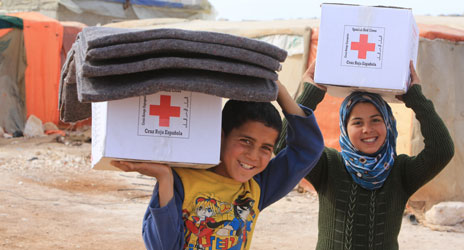President Joe Biden will seek to stave off another surge of civilian suffering in the devastating war in Syria when he meets President Vladimir Putin this week, appealing to Putin to drop a threat to close the last aid crossing into that country.
Russian forces have helped Syrian President Bashar Assad’s regime survive the more than 10-year conflict and Putin hopes to be a broker for Assad in any international reconstruction effort for that country. Russia holds the key veto on July 10 when the U.N. Security Council decides whether to extend authorization for the aid crossing from Turkey.
Putin meets with the American president in Geneva on Wednesday in their first face-to-face since Biden took office. The Russian leader already has pressed successfully for shutting down all other international humanitarian crossings into Syria, and argues that Assad should handle the distribution of any aid.
The aid crossing from Turkey into rebel-held northwest Syria serves up to 4 million people in Syria’s last remaining rebel stronghold. A decade of civil war in the Middle East country has killed a half-million people, displaced half of the population, drawn in foreign armies and extremist groups and left the economy in ruins.
Shutting down the international aid corridor and putting Assad’s government in charge of any humanitarian distribution would help position Assad as the winner in the war and Syria’s rightful ruler in the aftermath, and deepen the regional influence of Assad’s ally, Russia, in any rebuilding of Syria.
“Assistance should be given through the central government,” Putin told NBC News in an interview ahead of his meeting with Biden.
If there are fears that the assistance would be stolen, aid groups can post observers, the Russian leader said.
Opponents say Assad’s regime has not hesitated to use civilian starvation and siege as a weapon in the war, and fear a destabilizing surge of refugees into neighboring Turkey if the crossing shuts down.
The U.S. ambassador to the United Nations, Linda Thomas-Greenfield, visited the threatened Bab al-Hawa border crossing between Turkey and rebel-held northwest Syria earlier this month to warn that closing it would bring “senseless cruelty.”
Turkey, which already holds close to 4 million Syrian refugees, joins the U.S. in opposing closure of the crossing.
Mona Yacoubian, a senior adviser for the U.S. Institute of Peace think tank, said closing the Bab al Hawa aid crossing could “precipitate this humanitarian catastrophe” and a destabilizing surge of refugees.
Biden’s possible points of leverage with Putin, Yacoubian said, could include stressing the harm that a new round of civilian suffering in Syria could do to Russia’s image as it positions itself to oversee hoped-for Arab and other international aid to rebuild Syria.
There also could be consideration of granting humanitarian waivers on sanctions that the United States and others have levied on the Assad regime, Yacoubian said.
Russia argues that U.S. support for what started out as a peaceful uprising in Syria, and condemnation of Assad’s and other repressive governments during the Arab Spring, fostered instability and violence and boosted Islamic extremist groups.
Many in Biden’s administration were also in the Obama administration when it considered, but held back from, military intervention to stop Assad’s chemical attacks on civilians. They have since expressed regret that the United States’ overall handling of the conflict failed to stop the bloodshed.
AP

